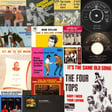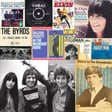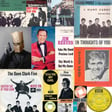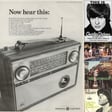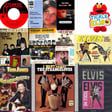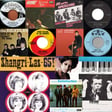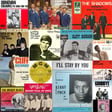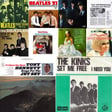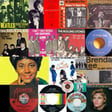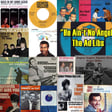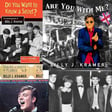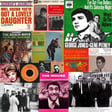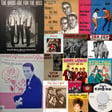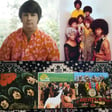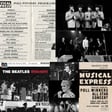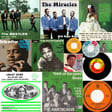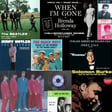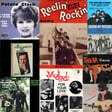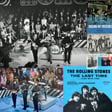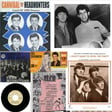Become a Creator today!Start creating today - Share your story with the world!
Start for free
00:00:00
00:00:01

September 1964 (side D)
September 1964 on the American charts continues. One of the best known (and deservedly so) Sam Cooke songs along with the Drifters, Sam Cooke, Ray Charles rockin' and rollin' while Capitol and the Beatles also do their thing! Support this podcast at the $6/month level on patreon to get extra content! Create your podcast today! #madeonzencastr
Recommended
Transcript
The Beatles' Optimism and Success
00:00:00
Speaker
The Beatles had this charm, John Paul and George, and probably then Stuart and Pete had this charm when things weren't going well, which in their world wasn't very often because mostly it was an upward trajectory. But nonetheless, sometimes you they would have a bad night or the gig didn't work properly or the amps broke or whatever. I say, where are we going, fellas? And they'd go to the top, Johnny.
00:00:23
Speaker
And I say, where's that fellas? And we say to the topper most of the popper most. And I say, right. And we all sort of cheer up. Now then, boys, where are we going? To the top, right? Where's that? To the topper most of the popper most.
Billboard Charts Overview (Sept 1964)
00:00:47
Speaker
Welcome to side D of Toppermost of the Poppermost for September of 1964. We are about to finish the month on the Billboard charts. Yes, indeed. But a lot of new songs to cover and buried all over the place in terms of styles and artists and a lot of Beatles songs and a lot of Motown and a lot of Motown. That's true. Some good Motown in this episode.
00:01:17
Speaker
Yes, indeed. All right. So the week of September 19th, we start off at number one with House of the Rising Sun by the Animals. At number 12 is A Hard Day's Night. One, two, three, At number 28 is And I Love Her.
00:02:08
Speaker
At number 32 is Matchbox.
00:02:14
Speaker
At number 43 is Slow Down.
00:02:41
Speaker
At number 55 is If I Fell.
Critique: Smokey Robinson's Songwriting
00:02:44
Speaker
um If I fell in love with you, would you promise to be true and help me understand? Cause I've been in love before and I found that love was more than just holding hands. At number 57 is George Martin and his orchestra's version of this boy. At number 78.
00:03:12
Speaker
That's what love is made of by the miracles. What is Smokey doing here? It's not terrible. A significant recycling of lyrics from what are little boys made of. A nursery rhyme dating back to the 1800s. The author of the original is uncertain, but maybe English poet Robert Southy. The chorus is new, but because of the rest of the lyrics, it still feels awfully cliche.
00:03:39
Speaker
Horns are good. Nice lead vocal from Smokey. The tune and backing is pretty similar to the Miracles previous effort. I like it like that.
00:04:17
Speaker
This is definitely not Smokey's finest hour with lyrics and no know you guys know I'm a huge Smokey fan but this is kind of a bit of a throwaway for him I think. The nursery rhyme metaphors get very old very fast. Yes.
00:04:34
Speaker
Snakes and snails and puppy dog tails. Yeah. Oh man. Really doesn't work. If the lyrics had been completely rewritten, this could have been a great record as I love the backing. The miracles harmonies, smokey turns into nice vocal, sharp production and arrangement. That bass line.
00:04:54
Speaker
The bass line, exactly. Bass line's great, but otherwise, yeah, Smokey's kind of treading water here in terms of the composition. The backing is still awfully reminiscent of I like it like that. I have to agree. Yeah, it is, but it's still well done. I like the backing. The lyrics are what really, in my opinion, harm the song the most. And it's Smokey. Sorry, Smokey. Sorry.
00:05:22
Speaker
Yeah, that line jumped out at me as well. Snakes and snails and puppy dog tails. Every time they kept singing, I was like, no, that's terrible. I know. Really sorry. It's awful. I do love Mrs. Robinson's voice in the background again. As I said before, and I'll say it again, later years when she's not a member of the miracles, I did miss her not being there in the background. Me too. Very good point. She really added a lot to the harmonies.
00:05:50
Speaker
Musically, Grey, the lyrics are what they are. And yeah, what jumped out to me the most, as I've already mentioned, that beautifully melodic bass playing that James Jameson's doing on there is astounding. Yeah, absolutely.
00:06:09
Speaker
ah Motown Junkies also says they hear a bit of Smokies, the way you do, the things you do, which I don't really hear that much of, but they go on about it a bit. Yeah, I didn't really hear that very much either. Motown Junkies, too, said, yeah, he was kind of phoning it in with the lyrics, because it's true that Smoky was, as far as writing for other people at this point, he was on fire. My guy, my girl.
00:06:34
Speaker
The list goes on and on. And so it was kind of like, oops, I need to write something for my group now resulted in this. It's awful in a way, because he's actually writing better material for everybody else than he is for the miracles. It's true. Well, he would make up for it soon enough.
00:06:50
Speaker
Yes, that's true. I'm quoting from the Motown Junkies, I'd underline that it still sounds really good. There are a couple of sweet moments and some great performances on backing vocals, which makes this record well worth a visit. It's just that for a miracle single written and produced by Smokey, that's kind of the bare minimum I've come to expect.
00:07:10
Speaker
This is a water treading wheel spinning entry in the miracles catalog. Pleasant enough, but lacking in everything that makes me love. I like it like that. And if anyone were to tell me that this was their favorite miracles record, I'd be deeply suspicious. I agree 100%. Exactly.
00:07:27
Speaker
Now on to a better Motan song, in my
Marvin Gaye's Vocal Brilliance
00:07:30
Speaker
opinion. I think we all would agree with that. At number 81, Baby Don't You Do It by Marvin Gaye. It's a great record. It's written by Haalandosur Haaland, great lead vocal. The Adantes are doing the backing. I just love that pounding dance rhythm. It's pretty amazing stuff. And I can't believe that this record was originally meant for the Supremes.
00:07:52
Speaker
Yeah, that's amazing. Can you picture them doing this at all? Not at all. I'll read the quote from Motown Junkies, which explains why I think. It's a taut stripped down, stripped back minimalist record with the bass churning up the speakers in great thudding ways and the drums pounding away and the bongos rippling and the backing vocals chanting and the riveting horns and guitars blaring over the top to create an actual wall of sound.
00:08:17
Speaker
that Marvin keeps on climbing even as the musicians trowel on more bricks. He continues to go about how what Marvin Gaye contributes to this song is the testosterone, which is the exact opposite of what the Supremes would have brought to it. Yeah, exactly.
00:08:59
Speaker
Marvin Gaye's vocal on this is incredible. He's, in my view, one of the greatest vocalists of all time. and And boy, does he show it here. And I think that's what you were just saying, climbing, climbing. And that's what he's doing in this, and particularly when he gets to the part where he's singing, you go down to the river, and there I'll be.
00:09:33
Speaker
He's just incredible, like he's just ready to throw himself in the river. and I mean, the way he sings it, and you believe it. He gets that grit in his voice. He's just fiery, begging, angry. He's just incredible in this. I wouldn't call this top tier Marvin Gaye, but it's definitely a fiery, fiery performance.
00:09:54
Speaker
If they were going to match it to any of the girl groups, I would have thought that the Vandalas would have been a better match, but even then I don't think that they'd be able to reach the level that Marvin does with this version.
00:10:05
Speaker
Yep. Agreed. Intensity and testosterone. I think those are two very good adjectives for this song. Yeah. Yep. I've always really enjoyed this song. And this is a great write by Holland Dozier-Holland. Wonderful vocal, fantastic backing by the Funk Brothers and the backing singers. That breakdown where it's just the percussion and drums and the vocal, that has always been a wow moment for me whenever it gets to that because that's just amazing. It's very different in some ways as well to the norm because it's very stripped like you get vocal and then a bit and then it's not constantly with all the other instruments it's more rhythmic
00:10:47
Speaker
with the percussion than everything else. And everything else just emphasises, if you know what I mean. you Amazing. I don't know what else to say. yeah The Who used to cover this live in the 1970s around the era of when they were leading up to recording Who's Next. And there's a very interesting rock version of this by The Who on the special editions of the Who's Next album. Oh, wow.
00:11:48
Speaker
At number 82, Ride the Wild Surf by Jan and Dean.
Serious Surf Films: 'Ride the Wild Surf'
00:11:53
Speaker
Brian Wilson still writing surf songs at this point in time. This was written by the Barry Christian Wilson team. Nothing particularly great about this song. It's standard surf guitar drums and vocal. The interesting thing is that this is the only pop song which is heard in The film ride the wild surf and we'll talk about that before we go on to the next song. Why don't you guys give your comments and then we'll get back to this film.
00:12:46
Speaker
Definitely a typical Jan and Dean harmonic surf track, big ending with strings, crescendoing, and that's really the giveaway that this is from a film. Other than that, I didn't find it particularly distinctive from their other tracks. Yep. It won't win any awards for Literature. It could win in terms of the amount of fun you can hear them having on the record. Can I hear Brian in the background on this?
00:13:15
Speaker
ah Maybe. I don't disagree. Because it sounds like in the chorus bits, these extra vocals, it sounds like Brian's there doing a deeper voice. Could be. Over to you, Ed.
00:13:27
Speaker
Okay. So the film is interesting because this is one of the few surf movies, which was not a goofy Frankie internet surf movie. This was actually a drama and it started Fabian tab hunter Shelley Fabre and Barbara Eden. Yeah. Mrs. Michael Ansara.
00:13:50
Speaker
It's a drama, it's not a comedy. And the other thing that this film is known for is that it features honest to goodness, real big wave surfing action. Point break before point break. That's right. I think it was pretty well reviewed at the time.
00:14:07
Speaker
We got a quote here from film historian Tom Lestani, who says that this movie stands head and shoulders above all the 60s beach party movies. It makes an honorable attempt to portray surfers and the sport of surfing sincerely and to showcase the big waves of the North Shore of Hawaii. There are no singing surfers or goofy motorcycle gangs. It is the best Hollywood surf movie of the 60s. I've never seen it. It makes me want to actually look it up. Yeah. Not to mention Barb Reid. We got to get Barb Reid props. yeah Anybody interested? I mentioned Michael and Saru because he was in Star Trek ah and he was married to Barbara Eden.
00:14:44
Speaker
Michael George-Onsaro portrayed Cochise in the television series Broken Arrow, Kane in the 1979-1981 series Buck Rogers in the 25th Century, Commander Kang in three episodes of the Star Trek television series, Deputy US Marshal Sam Buckhart in the NBC series Law of the Planesmen, and provided the voice for Mr. Freeze in Batman, the animated series and several of its spin-offs.
00:15:07
Speaker
The 20th Century Fox publicity department arranged a date between Ansara and actress Barbara Eden. The two later married an Ansara guest's art on Eden sitcom I Dream of Jeannie. Ansara and Eden divorced in 1974. Ansara received a star on the Hollywood Walk of Fame for his work in the television industry.
00:15:27
Speaker
At number 84, it's For You by Sila Black, which we've covered in the UK side. At number 85, I Don't Want to See Tomorrow by Nat King Cole. ah The opening choir here is just terrible. yeah And the choir is not great throughout the whole song. ah The Nat King Cole vocal is good.
00:15:48
Speaker
but the piano backing feels like a first cousin of crazy and not in a good way. It's probably worth listening to, but I don't know how good this record actually is. I rate it as just barely a miss. I don't want to sleep tomorrow.
00:16:24
Speaker
bright new sun will
00:16:43
Speaker
This was from his next to final album released in his lifetime called I Don't Wanna Be Heard Anymore. It was arranged and conducted by Ralph Carmichael. Again, this is from his very commercial period. He sings it beautifully. It's knocking coal. Of course, his vocals are lovely.
00:17:00
Speaker
But the song just isn't that strong. He does what he can with it. He has a slight country feel to it, but it's just that overdone chorus doesn't do him any favors and it's just not a very memorable song. and It was interesting, I was looking at the all music review that writer William Ruhlman gave of this album. and I thought it was interesting, he said that the album suffered from a lack of strong material and arrangements with the sad sentiments undercut by relatively quick tempos and a perky backup chorus.
Nat King Cole's Vocal vs. Material Quality
00:17:36
Speaker
And that's kind of like what this song is like because he is singing these sad sentiments and the chorus and the arrangements and all don't seem to match it, match the sentiments. So kind of true. So yeah, definitely not one of his finest songs to say the least.
00:17:54
Speaker
A flawless vocal over a song that has an incredibly over-the-top arrangement with lyrics that are so predictable that you know what's coming next. It's like I'm in rain with Spain. Those sorts of lyrics. It was difficult to listen to as well considering the fact of the title of the song and that we wouldn't have him for five months later.
00:18:18
Speaker
Yeah. And that's the truth. At number 87, do you want to dance by Del Shannon? It's another lesson inspired cover of a classic from Del Shannon. Del Shannon's vocal here doesn't really quite fit the song. It's kind of Frankie Valle-esque actually. And he does a little held note in the middle there, which just doesn't work at all. There's more of the Palisades Park organ and then it builds up toward the end and it's not great.
00:19:24
Speaker
I actually didn't mind his vocal so much. I thought the vocal was okay. It was the backing. The Palisades Park organ. It was like, here we go, roller rink again. And it was right out of runaway. Somehow it worked in runaway, but this, no, no, no, no.
00:19:44
Speaker
Dell comes across this out of work organist that played on Runaway and says, oh, do you want to earn a few few dollars? I'm just going in to do another song. You can do the solo for Runaway again, if you like. No, it's true. so It is. At least he's keeping him away from the welfare check. That's right.
00:20:06
Speaker
yeah Even without the organ, the rest of it, it was just like the blandest backing. I mean, the guitar, everything, it was just the most generic backing. There was just nothing distinctive about it. It needed a fiery guitar solo or something. It was just the blandest backing. If he had had a better backing band, it would have been okay.
00:20:29
Speaker
for how good a guitarist Del Shannon is. There's very little lead guitar on Del's work. yeah There are a few good versions of this included in Ed's Supercut. Before we get to the Supercut, there is actually a good Del Shannon version of this. He did it live in 1988 and he was joined by Jeff Lynn. This would be Del Shannon's last tour of England and on that tour were Jerry and the Pacemakers. oh Wow. They were backed by Marmalade. Dell was the headliner of this tour, which was called the Solid Sixties Silver Tour. And so you can find the Dell and Jeff Lynn version of it. And that's actually pretty good. Okay. It's kind of sort of the arrangement of the record, but they have switched it up enough that they smoothed out all the negative edges. Good. So,
Supercut: 'Do You Want to Dance' Covers
00:21:20
Speaker
all right. The super cut. Yes, we do have a super cut coming first off. Well, John Lennon did it for rock and roll.
00:21:26
Speaker
No question about that. Some of the other artists, Bobby Freeman, Bobby V, the Four Seasons, the Mamas and the Papas, Johnny Rivers, Bette Midler, Cliff Richard, the Ramones, the second one that everybody knows. Do you, do you, do you, do you wanna a dance? All right. now Dave Edmunds, T-Rex, the Beach Boys, 8-Bit Arcade, and a very young Kim Carnes. Oh, well wow. Wow.
00:21:52
Speaker
So look for it, it is on its way right now.
00:24:25
Speaker
Do you wanna dance? Do you do you do you do you wanna dance? Do you do you do you do you do you wanna dance?
00:25:32
Speaker
Do you want to dance?
00:26:29
Speaker
That was, do you want to dance our super cut at number 88 teen beat 65 by Sandy Nelson. It's another one of those, I'm going to remake a record for no real good reason. Although this is actually not bad. It's live sounding. It's a drum dominated instrumental. Good beat, good playing, but the original record was better. It sounds like it's supposed to be live, although I kind of doubt it is. It sounds like the crowd noise is all plastered on in post.
00:26:58
Speaker
Yeah, I wonder too. and And I agree. I think the original is better. It has a little more, I was going to say a little more energy, although this version is actually faster um than the original, but somehow the original still sounds a little more energetic. And I actually like the original without the crowd noise, but it is interesting to hear the solo in the middle, you know, very powerful.
Sandy Nelson's 'Teen Beat 65' Reimagined
00:27:54
Speaker
Marv, what were your thoughts on this? Re-recording of the 1959 single is to get rid of the crowd noise. I like this version. Co-written with guitar by Richie Podelaw. Oh my gosh! Who we mentioned earlier. Who was the guitarist and co-writer on most of Sandy Nelson's songs? I'd go into details, isn't he, I think, of who they went to school with.
00:28:19
Speaker
Yes, Sandy Nelson was born in 1938 in Santa Monica, California as Sander Nelson, and he attended high school with a whole slew of future rock and roll performers, names we know, including Jan Berry, Dean Torrance, and Phil Spector. That's quite a classroom. I bet music classes would raise it.
00:28:46
Speaker
So because of that connection, he actually would play on a number of Spectre records, including To Know Him Is To Love Him in 1958, which as we know was one of John Lennon's favorite records. And then the following year, 1959, he sessioned for Gene Vincent on Crazy Times and then struck out on his own. His fifth release, Teen Beat, made it all the way to number four.
00:29:11
Speaker
as an instrumental record, particularly a drum heavy instrumental record. That was pretty on unusual. now And then that pounding style was pretty distinctive. Sandy Nelson continued his work as a session drummer on many well-known rock and roll songs in the early 60s, including such top 10 hits as Alley Oop and A Thousand Stars. There's an interview with Sandy Nelson where he claims that Ringo told him that there is a Beatles version of Alley Oop somewhere in the EMI archives. I don't know whether I believe him or not, but he says that Ringo told him that, yeah, we used to do it with Rory and the Hurricanes. We tried it with the Beatles, but it just didn't work.
00:29:50
Speaker
But it exists, supposedly. Mark Lewis doesn't tell us anything about that, so I don't know whether it's wishful thinking or what. I wonder if Sandy played with any of his other, these other people he's worked with, because I've already mentioned earlier that Sandy was a member of the Renegades with Pollodor and Johnston, and then Johnston would go on to work this. I wonder if Sandy did any work drums-wise for the Ripcords or for Jan and Barry.
00:30:16
Speaker
We will leave that as something for our audience to let us know. In addition to actually having some connection with Ringo, Sandy Nelson covered back off Boogaloo. Oh wow. There's an instrumental version, but he did cover back off Boogaloo, which I find amusing. Cool.
Aretha Franklin's Early Style Exploration
00:31:11
Speaker
At number 90, Have I the Right by the Honeycombs, which we covered on the UK side. At number 95, Running Out of Fools by Aretha Franklin. Piano and drums dominated a really good vocal. It's a bit more seductive than we were used to hearing from Aretha Franklin. Good song, good backing.
00:31:31
Speaker
It's definitely atypical Aretha. The song goes a little bit off the end as the backing vocals start to overtake Aretha Franklin, but it only gets half a black mark for that. Well, this is fascinating because this is early Aretha.
00:32:02
Speaker
This is the period when she was on Columbia Records where they didn't quite know what to do with her. Pre-respect, pre-muscle shoals, pre-Atlantic. They didn't quite know what to make of her, what to do with her voice and and her image. I mean, if you see the cover artwork of the album that this is from called Running Out of Fools, she's go in this gown and is very glamorous and is very different. And this is kind of her Dinah Washington phase. And she's, as you noted, singing very differently here and really hasn't quite found her groove yet. She's singing very well. I mean, no doubt about it. She's Aretha Franklin. But this is not the more gospel
00:32:53
Speaker
bluesy, sassier version that we're used to. This is the early trying to find her way, or at least the label, trying to find who she really is. It'll be a few more years before we find the real Aretha, so this is a fascinating glimpse of her early career and it's good, but it's not quite the real Aretha.
00:33:19
Speaker
I like the song, but I'm really missing the grit that we would get from her later on. Yep. The voice that made her the first woman to but ever be inducted into the rock and roll Hall of Fame. She's not there yet, but she will be in a few years time. Exactly.
00:33:35
Speaker
At number 98, till the end of time by the Ray Charles Singers. More easy listening from the other Ray Charles. This was the flip of Aldi La. Not much to say about this record. It's pleasant enough, but again, not anything I really want to listen to. I will say it must have been awfully confusing since the real Ray Charles, Ray Charles minus the Singers, would record the same song in 1969. Wow. Till the well.
00:34:12
Speaker
I'll be there for you to care for you through laughter
00:34:43
Speaker
That links to something I mention when I start talking about my opinion of this. Oh, okay. Well, I won't have too much to say because it's kind of background music. Pleasant enough, maybe trying to sound slightly more modern. There's a little electric guitar in there, but otherwise pretty unremarkable background music. Definitely not something I'd go out of my way to listen to. yeah Take it away, Marv.
Ray Charles Singers: Background Music
00:35:11
Speaker
So, first of all, not one of the best writings by the usually fantastic Buddy Kay, who wrote this. He's written some cracking songs. and Well, in this case with this song, it isn't a cracking song. So, going to what Ed says, I actually thought about this and I thought, I wonder what this would be like if the actual other Ray Charles did a version of this. And now, I know that he did, and I've got to listen to it.
00:35:41
Speaker
and um got listen to that too
00:36:01
Speaker
At number 99, Sally was a good old girl by Fats Domino, written by Harlan Howard, who we have spoken of many times in the past. Famous country writer, hand claps, piano and vocal are great. Although it's fairly standard Fats, it's good stuff. Simple but nice guitar solo. Is this a song about a prostitute? I'm guessing it's something along those lines. You know, she's not a nun. We know that. No. Lots of innuendo. She might have yeah Oh!
00:36:34
Speaker
but Nicely done, sir.
00:36:59
Speaker
Lots of innuendo in the lyrics. Country flavor, definitely. And of course, Harlan Howard wrote it with Fats piano, although not as prominent as usual in a Fats record. Would have liked to have heard more. It's not top tier Fats for sure, but it's kind of fun. Fats as always has fun, particularly with lyrics like these that are playful and funny, but definitely not what I would rank as the best of Fats. Kit's been copying my homework. We're usually on the same wavelength. The first bit I wrote on my notes was fun but not top tier. Wow. It's not Blueberry Hill. It's not even a shame. It's a much softer Fats, but I might listen to it again if it was on the radio, maybe, because Fats makes it fun.
00:37:54
Speaker
Yeah. To quote just briefly from the lyrics, well, Sally was a favorite with all of the men because Sally was a good old girl. All of the ladies despised her then because Sally was a good old girl. It's entirely possible that McCartney may have been thinking of this ever so slightly when he wrote Lady Madonna. Who knows? Sally J. Yeah. Or to be more direct, as he said in that press conference, we just like writing songs about lesbians and monsters.
00:38:22
Speaker
Of course, because unlike this, Sally G, it didn't stand for good. And there are some really cracking covers of this as well, actually. Some of the artists who covered it, no supercut, but we will give you the name so you can look them up yourselves. Waylon Jennings, Buck Owens.
00:39:05
Speaker
Bobby Darin, Roy Clark, Conway Twitty, and believe it or not, Trini Lopez. Oh my god. Trini?
00:39:35
Speaker
So that is week three in September. We move on to the final week of September, September the 26th. At number one is Roy Orbison's Oh Pretty Woman. At number 19 is A Hard Day's Night.
The Drifters' Attempt to Recapture Glory
00:40:12
Speaker
at number 23 is Matchbox.
00:40:55
Speaker
2 is slow down.
00:41:01
Speaker
At number 59 is If I Fell. a
00:41:33
Speaker
At number 66 is Jerry and the Pacemakers with I Like It, covered on the UK side. At number 72, I've got Sand in My Shoes by The Drifters, a sequel to Under the Boardwalk. Not a complete miss, but a lot of the good elements are back. They are just slavishly copied. This song doesn't stand up, which is a real shame as the wistful summer is over feel.
00:41:58
Speaker
Could have been much more interesting than it actually is. This is more Godfather 3 than Empire Strikes Back. Top of most films. That is too funny because boy, that's the truth. in
00:42:42
Speaker
I agree. This could have been a lot better because it's not a totally bad idea to do kind of an end of summer. Sequel. But yeah, this is a, just a retread even doing you down by the sea the same way. The exact same way you've done a whole things all this already.
00:43:01
Speaker
say And of course, it's the same songwriters written by Kenny Young and Arthur Resnick. And it's just a shame that it's almost an exact copy, except for, of course, some of the lyrics. You know, the Drifters are better than that. They sing it well, of course, but it could have been a lot better. Just a quick aside, you'll appreciate this, Marv. I found out that Kenny Young, who co-wrote this, also wrote many other songs, including I Know Corita.
00:43:28
Speaker
co-wrote that, most famously covered by Quincy Jones. Oh yeah, he co-wrote that with Chaz Jankle from yeah The Blockette. Yes, just a little aside. But anyway, just very lesser copy of Under the Boardwalk.
00:43:45
Speaker
I don't know whether this will translate American. Do you call it Chinese whispers or not? The thing where one person comes up with something and they whisper it to the person next to them, and then they keep whispering it to all the people along the lines, and then at the end, this is what you get. We tend to call that the game of telephone. and In fact, ah Ken Womack mentions that in the live when they was fab from the fest. Go listen to that if you haven't listened to it already.
00:44:11
Speaker
It's like that, it's like somebody explains under the boardwalk or plays it to them in their ears and then they have to explain what under the boardwalk sounds like to the person next to them and eventually the one at the end comes out with this.
00:44:28
Speaker
That is literally how cry for a shadow. yeah that's true Somebody just sort of sang what they thought the record sounded like to George down the telephone line. And we can do something with that. And they thought they were going to play the new shadows record and it was nothing like the new shadow. It's as if they lost all the notes for under the boardwalk. And then that's trying to try and remember off the head, how it went about two years later. And the only remembered bits of it.
00:44:54
Speaker
Yeah, it's like close enough. So unlike band on the run, their tapes actually got stolen, huh? Yeah, just like Broad Street. Yeah, the tapes got well lost in the toilet.
00:45:06
Speaker
and sorry At number 73, Cousin of Mine by Sam Cooke, written by Sam Cooke. I don't know what to think of this song. It's a bit too poppy. It really feels to me almost like a first cousin of Hello Dolly because of the clear Dixieland lineage. It is a really great lead vocal, but it's like vaudeville. Yeah, it's just bizarre. I mean, it's Sam Cooke. Of course, he sings it well. But why was this released as a single? What is this?
00:46:03
Speaker
it's It's just bizarre. It should be an interesting B-side. Yes, it's just absolutely bizarre. I've read the lyrics again and again. I don't know if I quite understand the twist. No, I don't understand what this song is about at all. Exactly. It is maybe the strangest thing he ever recorded and wrote. So anybody ah you know listening who wants to fill us in on this song, I'd love to hear.
00:46:31
Speaker
a different and interesting
Dusty Springfield's Production Challenges
00:46:34
Speaker
avenue for him to experiment in and then thankfully go back to what we know him well for. That's for sure.
00:46:44
Speaker
At number 75, all cried out by Dusty Springfield. The tune is ever so slightly, you're no good. It's a great dusty vocal, but it's not a great production. Wall of sound, specter-ish, but it manages to be even muddier, believe it or not. I dislike the strings actively and the backing is pretty much too much.
00:47:06
Speaker
I agree with muddy, muddy production. She sings it well, great blue-eyed soul, but I just didn't like the song, I'm All Cried Out Over You. That chorus was repeated way too many times. I mean, it was like the songwriters wrote a certain amount of lyrics and then just ran out of ideas and just had her repeating, I'm all cried out over you an infinite number of times.
00:47:55
Speaker
Look for me when I'm a little bit of you. I'm all proud of you.
00:48:13
Speaker
Just not a strong production, not a strong song. Dusty tried. She sang it in her typically wonderful, soulful voice, but even she couldn't rescue this. I'm going to get a Louise quote in here. Oh, excellent. Louise said, not one of her best.
00:48:35
Speaker
yeah And also, I might add, solely written by Buddy Kay and not one of his best either. Dusty's vocal is great, but the production isn't, the strings are wrong, and it just doesn't work.
00:48:54
Speaker
Agreed. At number 77, Try Me by Jimmy Hughes. This is a cover of a James Brown song from 1958. It's a fairly straightforward copy, but the James Brown version is quite a bit better. The one thing Jimmy Hughes has that James Brown doesn't, it's a bit more pleading in the lead vocal.
00:49:14
Speaker
I do like the backing. The organ is great. It's played in a church organ style. I wish it were higher in the mix. I like the horns. I like the drums. Maybe a bit too much of the girl singers, but they're sparse enough to not annoy too much a hit, but just barely.
00:50:06
Speaker
I did not like the backing singers. Part of it is I have the James Brown version in my head so much that it's hard to top the James Brown version.
00:50:17
Speaker
And the backing singers really distracted me because I did not like how they were singing, try me and talk with me like that. You know, I was waiting for try me, you know, like that. I did not like that quick record. Yeah.
00:50:35
Speaker
Yeah, the staccato. Thank you. yeah Yes, did not like that at all. You know, i I wanted to hear that. Try me. You know, I just think that sounds better, or that same kind of pleading to emulate the lead singer. I did not like that style they were doing. Jimmy Hughes has a very good voice. I mean, no doubt about it. But you just can't match James Brown.
00:50:58
Speaker
Now, like I said, I would rather that have just got rid of the girl singers altogether. Yes. Ed's right. The organ is nice on this, but it's far too back in the background and covered by instrumentation.
00:51:30
Speaker
yeah yeah it's all right i suppose but the problem is like it i'm always going to go back to the james brown version
00:52:14
Speaker
The backing and production, I will agree with you that the original James Brown and the famous Williams version is better. The James Brown record is better, but just comparing the two lead vocals, I think he's giving James Brown a run for his
Ray Charles' Humor and Swing
00:52:26
Speaker
money. At number 78, I'm Crying by the Animals, which we covered on the UK side. At number 84, the door is still open to my heart by Dean Martin. A big dramatic opening.
00:52:38
Speaker
of one of those old-fashioned vocal openings. The song itself, yeah too much Dino. Big drums, overbearing backing. His lead vocal goes into a croon towards the middle of the song, and then they throw everything in for that big ending. By that point, my ears hurt. This is a miss.
00:53:34
Speaker
This was definitely not for me. That dramatic opening, way overdone. That huge bass drum. That boom, boom, boom, boom. Like, where is that coming from?
00:53:46
Speaker
The strings and backing singers, once again, way overdone. And yet the piano and drums, i mean regular drums at some point, had kind of a slight 50s, fat, domino sound, so they were trying to sound a little more contemporary, although this is, of course, 1964.
00:54:04
Speaker
So it wasn't exactly contemporary. It was this weird cross between 50s pop, but yet trying to make it sound like a little bit of rock. And then as you said, Dino, you know, the crooning kind of voice. It was just all over the place. Did not care for this.
00:54:23
Speaker
at all. I think they've tried to bring his backing sound up to date, but they've failed. right They've tried to put a bit of rock in there, but it doesn't work, which is a shame because I really like Dean. But you really need to listen to the original version from 1955 by the Cardinals, which reached number four in the R and&B playlist and number 10 in the charts.
00:54:48
Speaker
in 1955. That is great. There's some better versions of this song for sure. At number 89, smack dab in the middle by Ray Charles and his orchestra, the real Ray Charles. This song was originally released in 1955 by Charlie Calhoun and his orchestra. This version, great. Ray, the piano, the horns, the Ray Latzer may be a bit too much, but not so much as to be annoying and the lyrics, Kit may not appreciate them. I don't know, we'll find out, but they are funny and just this side of ah dirty. 50 chicks, not over 22. The lyrics are not at all subtle. Oh, I want to be smack dab in the middle on our boys. You can see why I want to be smack dab in the middle now so I can rock and roll to satisfy my soul.
00:55:42
Speaker
100 beds with chorus girls, a street that's paved with natural pearls, a wagon load of bonds and stocks that open up the door at Fort Knox. Now, of course, we all know what the phrase rock and roll originally meant. I can take it. I know. Hey, 50s blues and rock and everything. we're all i don't see We're all adults here. I can handle it. It's fine.
00:56:39
Speaker
I really like this. You can't help but smile when you listen to him. And and Ray Charles, he's just having so much fun with this. His voice sounds terrific. And it's what's interesting here is in a way, I mean, yes, of course, he's singing about rock and roll in the dirty way, but the band is swinging. He's swinging. yeah I agree. The backing singers are a little much and they also sound a little stiff.
00:57:05
Speaker
in this. They sound a little square. I would have liked them to sound a little more soulful here. This sounds a bit like Louis Jordan, kind of a cross between early rock and jazz. I really like this. I thought this was a lot of fun.
00:57:22
Speaker
ye Agreed. Loved this. Ray's vocal is something to absolutely almost cause far as to say to worship on this song. Fantastic. Great song. Everything's great about it. The Ray Letts. Yeah. I would have taken another stab at it to get their vocals a bit better. Yep. I agree. But we were all on the same page. We all liked this song a whole lot. It's a lot of fun. Yep. You can see why Ray's a legend with this. For sure.
00:57:49
Speaker
Unlike this next song, at number 90, Beach Girl by Pat Boone. A surf song by Pat Boone.
Pat Boone's Surf Rock Attempt
00:58:00
Speaker
And not just that, we'll we'll talk about it a little bit later, but the B side is Pat Boone doing a cover of Little Honda. oh boy This song was originally a ripcord song. Bruce Johnson and Terry Melcher, they were given the task of rejuvenating Pat Boone's career against Beatlemania. And so their decision was, let's turn them into a surf guy. Pat Boone and friends doing a really mediocre Beach Boys imitation. The backing is actually recorded originally for the ripcords. The ripcord did a version of the song. It's not the same as the ripcord's backing, but it was from that same session. yeah yikes the whole thing is pretty limp i love the wave sound effects i mean that's just funny to me the guitar riff out of don't worry baby and of course there's pat what can you say he's so mellow ah but it's not terrible
00:59:06
Speaker
I'll be true.
00:59:39
Speaker
The song has just enough charm to be able to carry Pat Boone's very much, uh, odd lead vocal, shall we say. Yeah. I mean, it's not the worst thing I've ever heard, but he's so bland. Just so bland. Yeah. I can see why the beach makeover wasn't really a success. Uh, Marv. Not lot to say. Okay. I know.
01:00:08
Speaker
It's a bit like Andy Williams, similar, is having a bit of a thing with his career. Let's get Brian Wilson to make a surf album with him. We've seen this all already in a slightly different way with them trying to get Chubby Checker to do folk songs.
01:00:26
Speaker
Yeah, that's true. What was this thing going around at the time of getting these artists to a well-known for doing this sort of stuff that they do, and then saying, do you know what, I'm sure that we can just get them to put their vocals in front of this thing that completely doesn't work at all. What would they have done next? Oh, is the music a little trivia? Let's see if you can do an opera. The ribcords are great.
01:00:52
Speaker
Yeah, they're fine. Pat's voice doesn't... Listen to the Ripcord's version. This is a really good album track from the Ripcord's. It's not a single, but it is a really good album track. It doesn't work here. Of course. If you want him to do a ballad that's in a crooner style, there you go. Pat Boone. If you want someone for surf music, not Pat Boone.
01:01:14
Speaker
exactly Now, this version sounds brilliant as opposed to the flip. As mentioned, the flip of this single is Pat Boone singing Little Honda. Oh boy. ah His vocal on that is worse than his vocal here. It is so stiff and so laughably bad. It borders on parody.
01:02:15
Speaker
I'm very thankful, being sarcastic there, for you sending us the link to that. Yeah. Because I listened to that and my comment was, yeah, that's great. Pat, you've just reminded me that I need to buy some new wood for the decking because your vocal was quite wooden.
01:02:32
Speaker
It is more stiff than when he would actually be trying to sing in a stiff fashion when he really did have his comeback. The metal? Yeah. but When he was in metal songs and things. Yeah. So his boon would return. That's right.
01:02:50
Speaker
At number 92, you really got me by the kinks, which of course we covered on the UK side at number 97. L O V E by Nat King Cole, a well-known song.
Nat King Cole's Timeless 'L.O.V.E.'
01:03:02
Speaker
I'm a fan of the lead vocal. I liked the horn breaks and I liked the horn stabs. The big brass section may be a little bit too busy, but it still works pretty well. And I think it deserves a spot in the Nat King Cole cannon.
01:03:16
Speaker
Absolutely. Yeah. This was his final single ah released in his lifetime. And it is part of his more commercial songs, but I think this one works. Yeah, I really do.
01:03:27
Speaker
It was song written by Burt Kemfort and Milt Gabler. It has a nice piano in it. I like the trumpet solo. I think that's a nice touch, which was performed by Bobby Bryant. And the lyrics are very catchy and very sweet. I actually kind of like the New Orleans style arrangement at the end. Yeah, it's a little bit bombastic, but, you know, it doesn't bother me that much. I think it takes a little twist at the end there.
01:03:54
Speaker
And Nat turns him just an incredible vocal performance. I just think he sings the lyrics with such joy and smooth, but with joy. I love this song. Yeah.
01:04:13
Speaker
L
01:04:36
Speaker
that you adore As soon as this song started, I thought, of course, I know this song. Yes. I thought, finally, we've got a top tier Nat King Cole song after the recent songs that we've had that have wasted his voice. It's been great on all of them vocally, but this one, it's great. I like the way that it builds and I'm especially going to point out the recording of those drums is fantastic.
01:05:08
Speaker
you When he's just doing the work on the hi-hats, those hi-hat cymbals, they come through crisp, clean, beautiful. As he graduates from there, he gets to soft playing on the drums and then he builds and builds and builds. They are immense. Brilliant. Yep. Agreed. So Nat King Cole recorded versions of this tune in several different languages. A combination of Japanese and English. Spanish.
01:06:17
Speaker
French. g ma
01:06:28
Speaker
That's quite a collection there. And so you mentioned it, there's our biggest Beatles connection and we probably haven't mentioned other than in passing, Burt Canford is of course the man who was behind the Beatles and Tony Sheridan.
01:06:45
Speaker
We've been talking a lot of what-ifs. Burt Canford actually might have done something interesting had he kept them to that Polydor contract. And if Polydor were willing to make something of the savage young Beatles, they actually might have been able to do something with the Beatles sound. Yeah.
01:07:01
Speaker
That's true. So, Camford didn't sign Tony Sheridan. He was given Tony Sheridan. Is that correct? I'm not sure. However, Tony Sheridan came to Camford. Camford said that he needed a backing band, and that was when he discovered the Beatles. The interesting thing is that he let them record Ain't She Sweet and Cry for a Shadow. I still don't know why he did that, to be honest with you. I don't know if that was some kind of deal that they made, or if we recorded with Tony Sheridan, could we record a couple of our own songs of some kind of deal like that. I don't know. Well, maybe they had some time at the end of the recording of doing Sheridan and Mr. Campers. So have you got anything else?
01:07:42
Speaker
Yeah, maybe. Could be. That's the other thing is that the record sounds so good, but they were in like an auditorium in a kindergarten or something like that where the first set of songs for Recanford and Polador. Yeah. It was definitely not a professional studio, but I mean, they had good microphones and good recording equipment. So that's why it sounds as good as it does. And then the Canford, my Bonnie is of course, what led to Brian Epstein coming down to the cavern and.
01:08:11
Speaker
the spark being lit. And so Burt camphor is indirectly responsible for everything that came afterwards. Thank you. bert We gotta give him credit, and all of that besides the fact that Burt Canford was an incredible recording artist in his own right. We close out with number 98, Bless Our Love by Gene Chandler. It's got ah that church bell opening. It's it's got a good lead vocal and a solid gospel sound. The backing is maybe a little bit too fifties.
01:08:43
Speaker
The piano goes a little bit tinkly and there's too much of it in the arrangement, but I like the the speed up, the charge to the end. This was probably once a great record, but it hasn't aged that well and it's at best good these days.
01:09:01
Speaker
God bless.
01:09:24
Speaker
A remix which would pull that amazing lead vocal up and reducing or updating the backing is sorely needed. Yeah, for sure. Now this was written by Billy Butler, who was the younger brother of Jerry Butler. Wow. And Gene Chandler sings it with conviction. What a voice. But I found the ballad was a little over dramatic. It was part of the marriage trend of records at the time we've talked about a bit, although this is of course sung from a male perspective and definitely has a more gospel kind of record. And yes, I think the production on it is very dated. Sorry Ken Michaels. Yeah, sorry Ken Michaels. They could use a remix
01:10:06
Speaker
to clarify the instrumentation on it, bring up his vocal a bit. But he sings it well. I'm just not crazy about the song itself. I just think it's a little heavy handed, you know, the the lyrics. and But Gene Chandler had it's such a terrific voice. I mean, so powerful.
01:10:25
Speaker
great vocal on this by Gene, although I do have to say, am I the only one who noticed that when he's supposed to be singing the word temptation, the way he phrases it, he phrases it as Timo-tation? Oh! Timo-tation
01:10:45
Speaker
I listened to it three or four times and yeah, he said Timo-tation. Yeah, you're right. Other than that, great vocal. Yeah, it's decent. and The mix is just not there. Yeah, agreed. All right, so that closes out the month of September. We will be back real soon with October of 1964. All right, see you then. Take care.
01:11:31
Speaker
There was a piece in the NME, a news piece, that said that Top Rank Records, remember when Top Rank had a record label? and They introduced an LP series next week that will be called Toppermost, and it's coinciding with their current advertising slogan, Toppermost of the Poppermost. Yes, and thought, they got it from someone.
01:11:51
Speaker
They saw that. They must have seen that in either the NME or record mirror or disc, record and show mirror as it was then. And they've taken it from there. They've obviously thought how stupid that is. How stupid is is one of those phrases that someone, an older person who doesn't understand teenagers comes up with a slogan that they think is going to be the hip slogan of the month.
